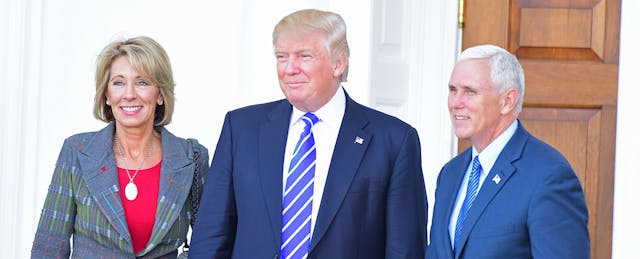President-elect Donald J. Trump has voiced his pick for Education Secretary, saying he’ll appoint Republican philanthropist and school-choice activist Betsy DeVos to the position.
DeVos is former chairwoman of the Michigan Republican Party and currently chairs the American Federation for Children, a single-issue group that advocates for expanding school choice options. “I am honored to work with the President-elect on his vision to make American education great again. The status quo in ed is not acceptable,” she tweeted (@BetsyDeVos) when the announcement went live.
So what does a DeVos appointment mean for K-12 and higher education in the U.S.? Here’s where she stands on a few key issues:
DeVos doesn’t support Common Core: “Many of you are asking about Common Core. To clarify, I am not a supporter—period,” she tweeted.
She’s pro-voucher: “The DeVos appointment signals that Trump is serious about the $20 billion school voucher plan he rolled out on the campaign trail,” wrote Dana Goldstein, in Slate.
She supports charter school expansion: DeVos and her husband established the Great Lakes Education Project, an advocacy group for school choice that was instrumental in getting Michigan to abandon plans to regulate charter schools earlier this year.
She says technology has a role in the classroom: “I think digital learning is in its infancy relative to the influence that it can and will have,” she told Philanthropy Roundtable in 2013. “I was bored all the way through high school. I can only imagine how much more boring it is today, when you check all of those new technologies at the door and go sit in rows of desks and listen to somebody talk at you for 30 or 40 minutes. Can you imagine sitting through an indifferent lecture when you know there are programs that make learning fun, resources that make information instantly accessible? I can’t.”
And here’s how education policymakers and experts are reacting to the news:
Jeb Bush issued a statement on Facebook: “Betsy DeVos is an outstanding pick for Secretary of Education. She has a long and distinguished history championing the right of all parents to choose schools that best ensure their children’s success. Her allegiance is to families, particularly those struggling at the bottom of the economic ladder, not to an outdated public education model that has failed them from one generation to the next."
Randi Weingarten, president of the American Federation of Teachers, told Politico: “DeVos has no meaningful experience in the classroom or in our schools. The sum total of her involvement has been spending her family’s wealth in an effort to dismantle public education in Michigan. Every American should be concerned that she would impose her reckless and extreme ideology on the nation.”
Sen. Lamar Alexander, chairman of the U.S. Senate education committee, called Ms. DeVos an “excellent choice,” and noted he looked forward to working with her to cut the “jungle of red tape that makes it more difficult for students to obtain financial aid and for administrators to manage America’s 6,000 colleges and universities,” according to a report in The Chronicle of Higher Education.
Diane Ravitch, research professor of education at New York University, wrote on her blog today: "I hereby formally withdraw my support for DeVos’s candidacy. To be sure, it was meant in jest, but many readers failed to see the humor in supporting someone who would totally privatize education."
The Detroit Free Press wrote that she would be “an inspired choice” in a staff editorial:
“Her philosophy is that there is no single answer to the education puzzle, but rather different options are required for different children and circumstances. She also advocates for modernizing how children are taught, and being open to new methods of learning.”
Steve Silberman, author and writer for Wired Magazine, tweeted, “Trump's pick of billionaire Betsy DeVos as Education Secretary is a direct assault on public education.”


